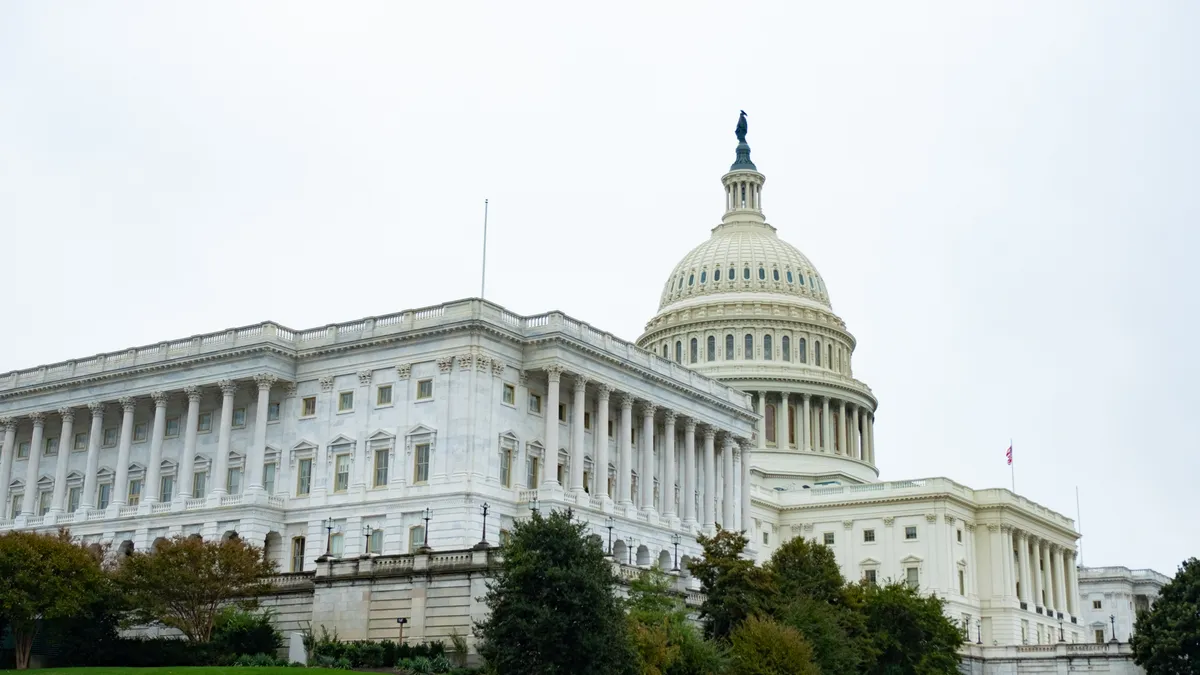Dive Brief:
- While President Joe Biden is pushing Congress to pass a sweeping $2.3 trillion infrastructure plan laden with clean energy and climate provisions, Democrats are considering a reconciliation process without Republican support as well as smaller-scale actions that could advance in a bipartisan manner.
- "There are some really good initiatives that have potential on a smaller scale to pass and garner some bipartisan support," Rep. Susan Wild, D-Pa., said Thursday at a panel hosted by think tank Third Way and the University of Michigan’s College of Engineering. Rep. Ritchie Torres, D-N.Y., however, said the political divisions in Washington mean that most serious climate legislating will have to come through the reconciliation process and without Republican support. "I would love nothing more than a bipartisan, bicameral compromise," Torres said, "but it’s hard to imagine."
- In a separate address, Energy Secretary Jennifer Granholm said the administration’s infrastructure plan had "effectively set the conversation around the need to set these critical investments" and said passage would elevate the country’s "ability to compete and ability to lead on climate."
Dive Insight:
Biden’s $2.3 trillion American Jobs Plan (AJP) includes $174 billion in spending on electric vehicle infrastructure, $100 billion for the power grid, $46 billion in clean energy manufacturing and $35 billion for research into technology to address climate change. The plan also includes a clean electricity standard and tax credits to support renewable energy and storage.
In his speech to Congress last week, Biden said "investments in jobs and infrastructure like the ones we’re talking about have often had bipartisan support in the past" and said he would hold "deep discussions" with Republicans on the plan. But, he added, "from my perspective, doing nothing is not an option." Republicans have remained largely opposed to the size and scope of the infrastructure plan, leaving reconciliation as the likely option to get it through the Senate.
Speaking at the Third Way panel, Rep. Torres, a freshman, said reconciliation is "the best hope for enacting anything resembling a bold infrastructure package," given widespread opposition from Republicans. "Bipartisan compromises tend to have more staying power," Torres said. "But we have no choice but to accelerate the transition to a clean energy economy."
However, Torres also noted that reconciliation comes with its own challenges because it must be budget-neutral. It is unclear, for example, if the clean electricity standard — which would set the country on a path to 100% emissions-free electricity by 2035 — could be enacted through the process. Deputy White House climate adviser Ali Zaidi told Reuters the standard could move through the process.
While Rep. Wild said that "as much as we can is going to have to be done through reconciliation," she added that the constraints meant there should be opportunities for smaller, bipartisan work. She pointed to the Energy Act of 2020 as an example of the "tried and true deliberative committee process and work," pointing out that elements of the AJP, like R&D spending and clean energy incentives, are extensions of bipartisan policies. Wild pointed to the Growing Climate Solutions Act, which would incentivize farmers and ranchers to adopt climate-friendly practices, and a carbon dividend trust fund (H.R. 2307) to support clean energy technology as examples of lower-cost legislation that can add up to major changes.
Granholm said that the wide scope of the AJP was necessary to ensure the widespread economic change and job creation that the administration is pushing. She touted the plan’s all-of-the-above approach to addressing multiple energy industries, whether it was support for fossil fuel communities or new commitments to buy American-made products. That, she said, includes support for nuclear energy, despite concerns from some environmentalists.
"Nuclear is a critical part of the decarbonization equation," Granholm said, adding that the jobs plan includes investments for deploying advanced reactors. "We don’t want to see [plants] retire right when we need them."














